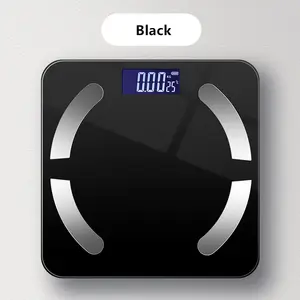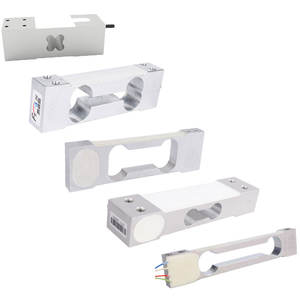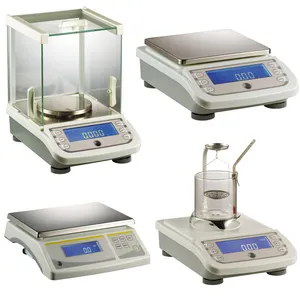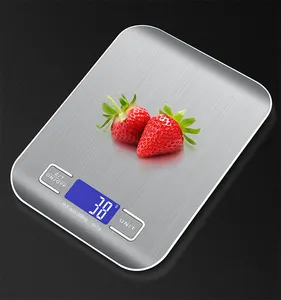Textile Weight Measurement Scales
Textile Weight Measurement Scales are indispensable tools in the textile industry, specifically crafted for gauging the weight of fabric or yarn. These devices play a crucial role in various textile operations such as quality control, inventory management, and determining shipping costs, and are commonly utilized by textile manufacturers, garment producers, and retailers who require precise weight measurements.
The operational principle of Textile Weight Measurement Scales hinges on the force of gravity. As an object is positioned on the scale, it applies a downward force due to gravity, which the scale's load cell quantifies. Subsequently, the load cell converts this force into an electrical signal, processed to provide a weight reading. The scale's software and display unit then exhibit the measured weight in diverse units like grams (g) or ounces (oz).
Textile Weight Measurement Scales come in varied capacities and precision levels to accommodate a broad spectrum of needs. They are equipped with functionalities such as a tare function for subtracting the weight of containers, materials, or packaging; an auto-zeroing feature for accuracy assurance; and connectivity options for seamless integration into production systems. With technological advancements, these scales have evolved to offer advanced attributes including touch-screen interfaces, multiple weighing modes, and high precision tailored for demanding applications.
Classification of Textile Weight Measurement Scales
The textile industry employs a range of scales for weight measurement, each tailored to suit distinct material characteristics and operational demands.
-
Balance Scales: These scales function based on balancing weights and are commonly found in textile laboratories for precise measurement of small samples. They possess the sensitivity to detect minute weight differences, down to a single thread.
-
Counting Scales: Equipped with a component that counts items by weight, these scales are ideal for measuring consistent batch sizes or for inventory management where item quantity is crucial. Counting scales often incorporate features like a conveyor belt or vibrating platform to facilitate counting.
-
Digital Scales: Known for their ease of use and accuracy, digital textile weight measurement scales feature an electronic display showcasing weight measurements. They are preferred for swift and clear readings, commonly deployed at points of sale or in quality control departments.
-
Fabric Tension Measurement Scales: These specialized scales are designed for measuring tension in woven or knitted fabrics, ensuring that fabrics meet quality standards for elasticity and strength in production settings.
-
Portable Scales: Offering convenience and versatility for on-the-go weight checks, portable textile weight measurement scales are lightweight and suitable for diverse locations such as warehouses or trade fairs.
Selection of Textile Weight Measurement Scales
Choosing the appropriate Textile Weight Measurement Scale for your business necessitates careful consideration of various factors aligning with your specific requirements. Here are key points to ponder:
-
Capacity and Accuracy: Determine the weight range requiring measurement and the necessary level of precision. Scales are available in different capacities with varying accuracy levels.
-
Durability: Given their industrial application, these scales must be durable to endure frequent usage and diverse environmental conditions.
-
Functionality: Consider additional features such as data output capabilities for system integration, material construction (e.g., stainless steel for durability), and preference for touch screens or custom displays.
-
Operational Environment: Ensure the scale is suitable for specific environments like dyeing or quality control areas, potentially requiring features such as waterproofing or dustproofing.
By deliberating on these factors and comprehending their relevance to your business operations, you can make an informed decision ensuring efficiency and reliability in your weighing procedures.
About Textile Weight Measurement Scales on Alibaba.com
Alibaba.com stands as a leading online marketplace offering a vast array of textile weight measurement scales tailored for businesses worldwide. With a track record of over two decades facilitating B2B transactions across 190 countries, Alibaba.com has positioned itself as a platform where reliability meets diversity. The platform's extensive network of suppliers ensures businesses can discover scales customized to their specific needs, whether for lightweight textiles or heavy-duty materials.
Buyers benefit from detailed product descriptions, multilingual supplier communications, and services like Trade Assurance, safeguarding payments until delivery completion. This commitment to security and customer satisfaction underscores why Alibaba.com is a trusted source for wholesale acquisitions.
Textile weight measurement scales on Alibaba.com cater not only to traditional manufacturers but also to e-commerce resellers seeking to provide quality measuring equipment to their clientele. The platform's global accessibility and user-friendly mobile features streamline the procurement process, enabling businesses to efficiently source products irrespective of their location or size.
Frequently Asked Questions about Textile Weight Measurement Scales
What is a textile weight measurement scale?
A textile weight measurement scale is a device utilized for weighing textiles, fabrics, yarns, and other materials, playing a pivotal role in quality control and inventory management within textile manufacturing and retail enterprises.
How does a fabric weight measurement scale operate?
A fabric weight measurement scale functions by suspending the textile on a platform or hanger and subsequently recording its weight. The scale calculates the weight by deducting the fabric's weight from the total weight, displayed on the scale's screen.
What materials can be measured with a textile weight measurement scale?
A textile weight measurement scale can measure a variety of materials including textiles like yarn, fabrics, and fibers, as well as heavier materials such as bolts of cloth and thicker items like quilts or comforters.
Are different capacities available for textile weight measurement scales?
Yes, textile weight measurement scales are offered in various capacities, typically ranging from 300g to 6000g or more, depending on the material volume and desired scale range.
How accurate are textile weight measurement scales?
The accuracy of textile weight measurement scales varies by model, emphasizing the importance of choosing a scale that aligns with the precision level required for specific business operations.
Can textile weight measurement scales be customized for specific business needs?
Many suppliers on Alibaba.com provide customization options for textile weight measurement scales to meet distinct business prerequisites.
Are portable textile weight measurement scales available?
Yes, portable textile weight measurement scales are accessible for scenarios requiring mobility, such as fieldwork or travel.
What factors should be considered when selecting a textile weight measurement scale for inventory management?
When choosing a scale for inventory management, consider the materials needing measurement, required weight range, measurement speed, and additional features like connectivity or data logging.
How can I ensure a textile weight measurement scale complies with my business's regulatory standards?
It is essential to verify that the scale meets industry standards and certifications relevant to your business operations to ensure compliance with regulatory mandates.
Are there maintenance requirements for textile weight measurement scales?
Maintenance needs vary by model but typically encompass regular calibration and ensuring the scale remains clean and free from physical damage.
Can textile weight measurement scales support continuous weighing operations?
Indeed, specific models of textile weight measurement scales are designed for continuous weighing operations, incorporating features like conveyor belt systems.
What distinguishes mechanical from electronic textile weight measurement scales?
Mechanical scales necessitate manual operation for measurements through physical weight adjustments, whereas electronic scales offer automated and often more precise readings with minimal human intervention.
































 浙公网安备 33010002000092号
浙公网安备 33010002000092号 浙B2-20120091-4
浙B2-20120091-4